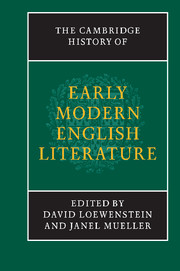Book contents
- Frontmatter
- Introduction
- 1 Modes and means of literary production, circulation and reception
- 1 Literacy, society and education
- 2 Manuscript transmission and circulation
- 3 Print, literary culture and the book trade
- 4 Literary patronage
- 5 Languages of early modern literature in Britain
- 6 Habits of reading and early modern literary culture
- 2 The Tudor era from the Reformation to Elizabeth I
- 3 The era of Elizabeth and James VI
- 4 The earlier Stuart era
- 5 The Civil War and Commonwealth era
- Chronological outline of historical events and texts in Britain, 1528–1674, with list of selected manuscripts
- Select bibliography (primary and secondary sources)
- Index
- References
4 - Literary patronage
from 1 - Modes and means of literary production, circulation and reception
Published online by Cambridge University Press: 28 March 2008
- Frontmatter
- Introduction
- 1 Modes and means of literary production, circulation and reception
- 1 Literacy, society and education
- 2 Manuscript transmission and circulation
- 3 Print, literary culture and the book trade
- 4 Literary patronage
- 5 Languages of early modern literature in Britain
- 6 Habits of reading and early modern literary culture
- 2 The Tudor era from the Reformation to Elizabeth I
- 3 The era of Elizabeth and James VI
- 4 The earlier Stuart era
- 5 The Civil War and Commonwealth era
- Chronological outline of historical events and texts in Britain, 1528–1674, with list of selected manuscripts
- Select bibliography (primary and secondary sources)
- Index
- References
Summary
Following the suppression of the monasteries and the turmoil in the church in the 1530s, the patronage of writers became almost exclusively secular, with the monarch and the nobility broadly accepting that the encouragement of learning was one of the functions of power and authority. In a complementary way, authors and printers knew that a book could not come abroad without the name of a patron affixed in order to signal that a powerful figure stood behind the exposed and vulnerable author. Patronage in the early Tudor period was neither systematic nor sustained, and its recipients had limited expectations. In general, a writer would be satisfied with the presence of a protective name at the head of his work; reward was not a significant factor in dedications, for most authors (themselves not a numerous group) already had a post in life, and an affiliation with some great household. Their dedications were mostly expressions of loyalty or gratitude rather than anglings for future favours. Hope of reward in the form of office, advancement or money is a feature of later Elizabethan times, when writers proliferated and aspired to earn a living or advance their careers by publication. In the earlier Tudor period, however, when the number of printed books was relatively modest, and readership limited to the educated, a book needed a guarantee of its worth. The importance of a titled dedicatee has to be recognised: in an aristocratic age a noble name offered assurance that the contents had merit, and reassurance that there was no harm, political or religious, in the work.
- Type
- Chapter
- Information
- The Cambridge History of Early Modern English Literature , pp. 117 - 140Publisher: Cambridge University PressPrint publication year: 2003
References
- 1
- Cited by



